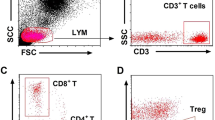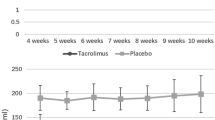Abstract
Objective
To evaluate Chinese medicine prescription, Anzi Heji (安子合剂, AZHJ), on immune regulation of CD4+CD25+FOXP3+ regulatory T cells (Tregs) in anticardiolipin antibody (ACA)-positive patients with threatened abortion.
Methods
Twenty-seven ACA-positive female patients with threatened abortion in the study group were treated with an aqueous extract of AZHJ 125 mL, twice daily for 4 consecutive weeks. The results were compared with control group composed by 15 healthy pregnant women. The ratio of CD4+CD25+FOXP3+ Treg in peripheral blood was identified by flow cytometry. The indicators of ACA were detected by enzyme-linked immunosorbent assay, and embryo development was checked by B-ultrasound.
Results
Compared with the control group, the ratio of CD4+CD25+FOXP3+ Treg cells in the study group was significantly lower before AZHJ treatment (P<0.01) and significantly increased after AZHJ treatment (P<0.01). After treatment, 20 of 27 patients (85%) showed that ACA indicators turned into negative, and 7 cases of quantitative indicators of ACA titers were significantly decreased (P<0.01). Total efficiency of treating miscarriage by AZHJ was 92.59%.
Conclusion
AZHJ can regulate the immune function of pregnant women by increasing number of CD4+CD25+FOXP3+ Tregs.
Similar content being viewed by others
References
Billingham RE, Brent L, Medawar PB. Actively acquired tolerance of foreign cells. 1953. J Immunol 2010;184:5–8.
Thellin O, Coumans B, Zorzi W, Igout A, Heinen E. Tolerance to the foeto-placental 'graft': ten ways to support a child for nine months. Curr Opin Immunol 2000;12:731–737.
Aluvihare VR, Kallikourdis M, Betz AG. Regulatory T cells mediate maternal tolerance to the fetus. Nat Immunol 2004;5:266–271.
Blois SM, Ilarregui JM, Tometten M, Garcia M, Orsal AS, Cordo-Russo R, et al. A pivotal role for galectin-1 in fetomaternal tolerance. Nat Med 2007;13:1450–1457.
Terness P, Kallikourdis M, Betz AG, Rabinovich GA, Saito S, Clark DA. Tolerance signaling molecules and pregnancy: IDO, galectins, and the renaissance of regulatory T cells. Am J of Reprod Immunol 2007;58:238–254.
Kropf P, Baud D, Marshall SE, Munder M, Mosley A, Fuentes JM, et al. Arginase activity mediates reversible T cell hyporesponsiveness in human pregnancy. Eur J Immunol 2007;37:935–945.
Gu Y, Wang C, Han D, Zhang L. Increased frequencies of CD4+CD25+FOXP3+ regulatory T cells in human nasal inverted papilloma. Head Neck 2011;33:1005–1012.
Chen SJ, Liu YL, Sytwu HK. Immunologic regulation in pregnancy: from mechanism to therapeutic strategy for immunomodulation. Clin Dev Immunol 2012;2012:258391.
Shima T, Sasaki Y, Itoh M, Nakashima A, Ishii N, Sugamura K, et al. Regulatory T cells are necessary for implantation and maintenance of early pregnancy but not late pregnancy in allogeneic mice. J Reprod Immunol 2010;85:121–129.
Toldi G, Saito S, Shima T, Halmos A, Veresh Z, Vásárhelyi B, et al. The frequency of peripheral Blood CD4+ CD25 high FOXP3+ and CD4+ CD25-FOXP3+ regulatory T cells in normal pregnancy and pre-eclampsia. Am J Reprod Immunol 2012;68:175–180.
Wu T, Zhang L, Xu K, Sun C, Lei T, Peng J, et al. Immunosuppressive drugs on inducing Ag-specific CD4+CD25+Foxp3+ Treg cells during immune response in vivo. Transpl Immunol 2012;27:30–38.
Fujio K, Okamura T, Sumitomo S, Yamamoto K. Regulatory T cell-mediated control of autoantibody-induced inflammation. Front Immunol 2012;3:28.
Heilmann L, von Tempelhoff GF, Pollow K. Antiphospholipid syndrome in obstetrics. Clin Appl Thromb Hemost 2003;9:143–150.
Tiskievicz F, Mallmann ES, Brenol JC, Xavier RM, Spritzer PM. Prolactin, estradiol and anticardiolipin antibodies in premenopausal women with systemic lupus erythematosus: a pilot study. Rev Bras Reumatol 2011;51:460–464.
Spegiorin LC, Galão EA, Bagarelli LB, Oliani AH, de Godoy JM. Prevalence of anticardiolipin antibodies in pregnancies with history of repeated miscarriages. Open Rheumatol J 2010;4:28–30.
Giasuddin AS, Mazhar I, Haq AM. Prevalence of anticardiolipin antibody in Bangladeshi patients with recurrent pregnancy loss. Bangladesh Med Res Counc Bull 2010;36:10–13.
do Prado AD, Piovesan DM, Staub HL, Horta BL. Source Association of anticardiolipin antibodies with preeclampsia: a systematic review and meta-analysis. Obstet Gynecol 2010;116:1433–1443.
Zhong YP, Ying Y, Wu HT, Zhou CQ, Xu YW, Wang Q, et al. Impact of anticardiolipin antibody on the outcome of in vitro fertilization and embryo transfer. Am J Reprod Immunol 2011;66:504–509.
Trammell RA, Cox L, Pikora J, Murphy LL, Toth LA. Evaluation of an extract of North American ginseng (Panax quinquefolius L.) in Candida albicans-infected complementdeficient mice. J Ethnopharmacol 2012;139:414–421.
Thakur M, Connellan P, Deseo MA, Morris C, Dixit VK. Immunomodulatory polysaccharide from Chlorophytum borivilianum roots. Evid Based Complement Alternat Med 2011;2011:598521.
Liu F, Luo SP. Effect of Chinese herbal treatment on Th1- and Th2-type cytokines, progesterone and betahuman chorionic gonadotropin in early pregnant women of threatened abortion. Chin J Integr Med 2009;15:353–358.
Le J, ed. Obstetrics and gynecology. Beijing: People's Medical Publishing House; 2003:12–14.
Cao ZY, ed. Chinese obstetrics and gynecology. Beijing: People's Medical Publishing House;1996:321.
Zheng XY, ed. Guiding principle of clinical research on new drugs of traditional Chinese medicine. Beijing: Chinese Medical Science and Technology Press; 2002:249–254.
Cao ZY, ed. Chinese journal of obstetrics and gynecology. Beijing: People's Medical Publishing House; 1999:93.
State Administration of Traditional distribution, ed. Traditional Chinese medicine Syndrome Diagnostic efficacy standard. Nanjing: Nanjing University Press; 1995:68.
Author information
Authors and Affiliations
Corresponding author
Rights and permissions
About this article
Cite this article
Lu, Qb., Zhu, S. Modulation of an aqueous extract of Chinese medicine prescription Anzi Heji (安子合剂) on ratio of CD4+CD25+FOXP3+ regulatory T cells in anticardiolipin antibody-positive patients with threatened abortion. Chin. J. Integr. Med. (2016). https://doi.org/10.1007/s11655-015-2444-3
Received:
Published:
DOI: https://doi.org/10.1007/s11655-015-2444-3




